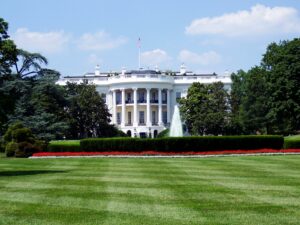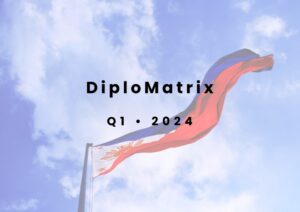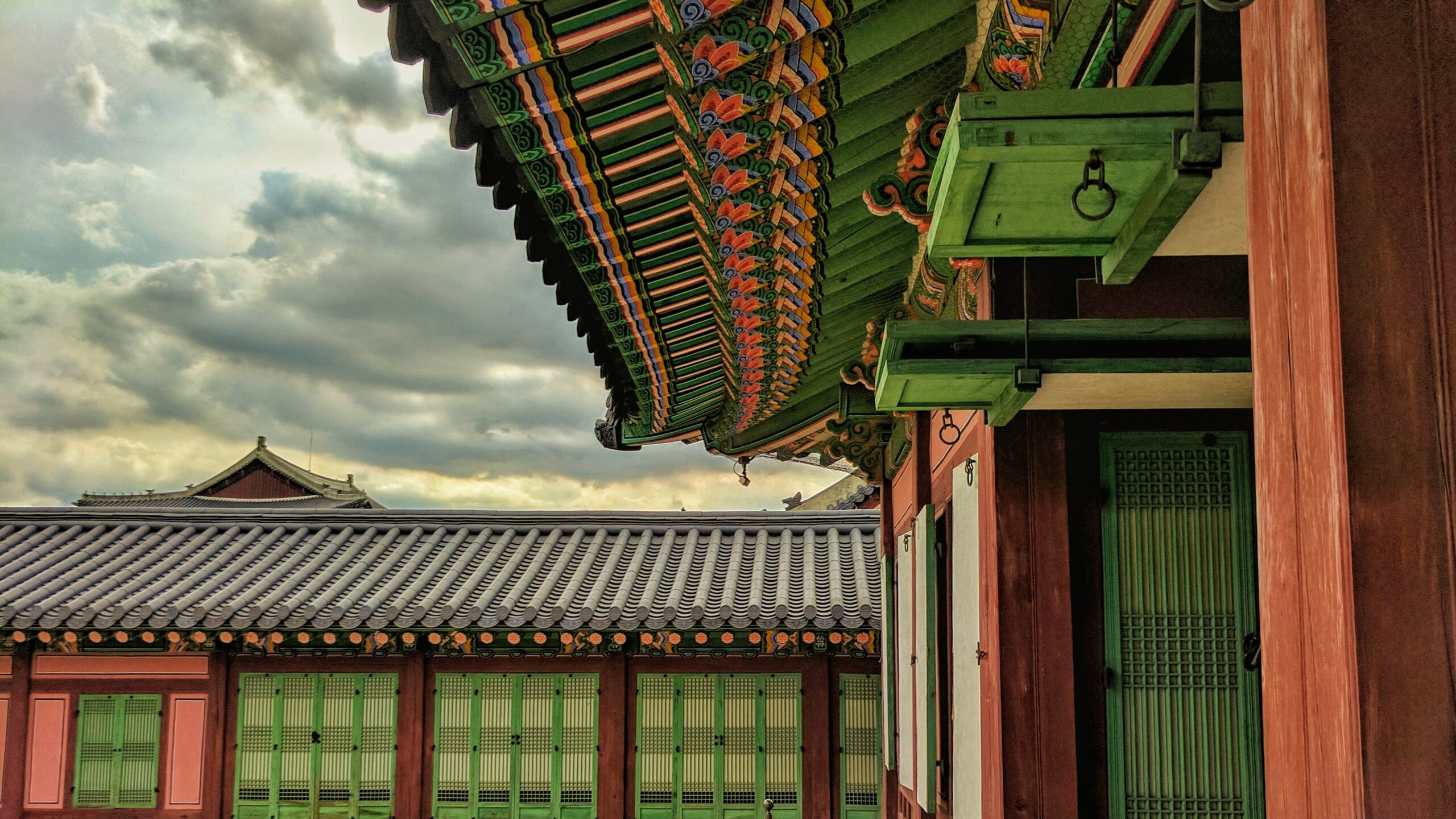Monday, November 25 2019
Paris – Hôtel d’Evreux, Place Vendôme
A FRANCE-KOREA DISCUSSION
Once again world leader of the Bloomberg Innovation Index in 2019 and first country to ever launch a 5G network, the Republic of Kore’s economic strategy crucially leans on new technologies. At the same time, Seoul breaks through with a new attitude of opening from President Moon, who shows a will to negotiate with North Korea, therefore rising as a key actor within an increasingly complex commercial and regional context. Focusing on innovation and cooperation perspectives, qualified experts from both France and South Korea enlightened the recent evolutions in the diplomatic climate, as well as the perspective for resolution of long-term and recent hardships.
5G AND INNOVATION POLICIES
5G will drive tomorrow’s innovations. In the competition for global technology leadership that lies ahead between China and the US, secured 5G infrastructure deployment is thus expected to bring a key advantage, as shown by Donald Trump’s decision to ban Huawei from operating in the US. In this context, is there room for further cooperation between France/EU and Korea? As a global leader on 5G and innovation policies, Korea has a lot to offer to a deeper France/EU-Korea integration that could help both sides balance the risk of high dependency on both US and Chinese technologies.
Frédéric Simottel, BFM Business TV, Tech & Co TV
Doo-hee YUN, OECD ICT and Digital specialist
Heungchon KIM, KIEP Senior Research Fellow
An overview on 5G
5G is mainly characterized by faster speed and data flow (100 times faster than today’s cellular connections), as well as a very short latency. The combination of speed and responsiveness makes 5G not only the new generation of wireless network, but a structural technology that will reach the capabilities of others. Major industrial applications are indeed expected in the realm of the Internet of Things, just to mention self-driving cars and virtual reality. The billions of connected objects expected in the future will allow algorithms to continuously collect data on people’s lives, thus providing a threat towards individual freedoms. The huge power stemming from this data collection capacity also places telecommunication industrials like Huawei at the core of geopolitical tensions. Donald Trump decided to ban the Chinese firm from operating in the US and European countries are still dealing with how to address the threat towards their sovereignty implied by relying on foreign technology in 5G network deployment. But as Nokia and Ericson lag behind their Asian competitors in both quality and price, and as European countries do not want to postpone the commercialization schedule, it seems that 5G network will be built in cooperation with Korean or/and Chinese industrials.
5G in Korea and Agendas for Innovation in Digital Economy
Korea is well advanced on 5G deployment. It seized the Pyeongchang Olympic winter games opportunity back in February 2018 to provide the worldwide first 5G network. The government auction took place in June of the same year and the commercialization was successfully launched last April. As of September 2019, 3.4 million Korean people already had a 5G subscription. By following an ambitious 5G agenda, the Korean government foresees major fallouts for the Korean industry. 5G network is expected to first bolster the Korean semiconductor industry, a world class leader. As new generations of smartphones and computers are also to follow the implementation of 5G, it should bring huge outlets to the Korean screen industry and especially to big companies such as Samsung and LG. Regarding digital transformation, a lot of new business models are expected to flourish. The Korean government recently launched the Development Plan for Digital Trade. Under this plan, technologies such as blockchain, big data and artificial intelligence will be applied to digitize the entire Korean trade and finance ecosystem by 2021. The particularly advanced Korean internet culture, which is considered to have prospered on the uniquely high penetration of broadband in the country over the last two decades, should also see high benefits from 5G technology deployment.
Innovation policies cooperation between the EU and Korea
Whereas people-to-people cooperation exists in terms of innovation between France and Korea, there is a lack of policy cooperation between both countries, especially when it comes to SMEs and EU industrial policy levels. The acknowledged meaning of innovation has broadened since Schumpeter defined it. It no longer only refers to disruptive innovation but rather to incremental innovation. As innovation activities in a free market economy bear high costs (consistent R&D spending, high risks, financing difficulties), state intervention in the form of Innovation Growth Policies (IGP) is needed to foster innovation, such as subsidies or the building of techno-infrastructure. Regarding SME policies between both countries, cooperation should be fostered in the cluster policy realm. The latter is indeed key to SME development as it helps bridging the competitive and technical gap between innovation and commercialization by encouraging SMEs to cooperate and share resources. This could for example take the form of online cluster networks, which would foster cooperation between clusters in both countries. This has also to be furthered by the establishment of nationwide competence centres in order to allow SME in both countries to have clear and specific cooperation objectives. Cooperation between research institutions should also be encouraged, as it lags behind compared to cooperation between Korea and other EU countries such as Germany in that realm. As far as cooperation between EU and Korea is concerned, both sides must escape from the obsession with “cutting-edge” projects and focus more on ordinary technology level cooperation, which make the biggest share of value-added.
REPUBLIC OF KOREA – SECOND PANEL: NEW GEOSTRATEGIES IN NORTH-EAST ASIA
While the world knows great changes and witnesses China’s economic, politic and military rise; as South Korea-Japan relations are questioned; after an ASEAN reunion that showed difficult relations between the United States and Asian Countries, Seoul breaks through with a new attitude of opening from President Moon, who shows a will to negotiate with North Korea.
Hence, what kind of position can the Republic Korea hold in this very fast changing area?
François Godement, Montaigne Institute
Jean-Yves Colin, Asia Centre Advisory Board
Antoine Bondaz, Fondation for Strategic Research
Jae-Seung LEE, Korea University, Jean Monnet Chair
Jouhyun KO, Yonsei University research professor
Jong-chul PARK, Gyeongsang University Professor
The Korean situation in the new regional order
For more than a decade, Korea’s choice to be at the centre of a region that is being torn apart with different forces, and exercise its influence in all directions despite the current huge risk of fragmentation, has been somewhat dangerously fulfilled. On the other hand, the risk that the Republic of Korea has taken appears manageable in comparison with the current regional irrationality, where the established routine of bilateral trends can no longer be taken for granted. Regarding North Korea, the American agenda becomes hard to read and its unpredictability has now grown into being more of a threat than a strategy. In parallel, the UN sanctions committee is not working properly, which makes the process difficult to oversee. Therefore, we have not seen an end to the nuclear adventure in the North and will see more missiles. In this unsolved situation, the Republic of Korea’s current policy of engagement of maintaining some consistency is validated by the fact that a conflict still has not happened. Nevertheless, this strategy remains quite blind and of an unclear timescale. The French and European position as “honest brokers” becomes challenging to hold, as we have lost our moral compass on the issue of populism – a successful gimmick in North Korea as well as in other societies and, despite countless predictions, the “real risk” of a war between the DPRK and its surroundings has not materialized.
South Korea’s dilemmas within the US-China tensions
While Korea’s first priority is peace building on the peninsula, the country also needs to lean towards prosperity. In North-East Asia’s cold war legacy, the Republic of Korea so far maintained a relative equilibrium; but the US-China imbroglio raises several dilemmas both on the economic and political side. Firstly, while the US has long been a major security ally, China recently grew into being a significant economic partner and recently acting in a more aggressive way. Emerging issues with the US, including the scale down of joint military exercises, are compromising Korea’s balanced position. Should the American support fade, can China provide a similar security guarantee? Second, the Republic of Korea needs China’s coordination and cooperation to deal with DPRK. How to choose between Inter-Asian and inter-Korean priorities – an issue that also raises the major stake of trusting North Korea’s goodwill? Thirdly, by trying to engage peace with Northern neighbours, Korea temporarily sacrifices Human Right issues: what kind of value system should be applied between the “universal” one and the peculiarity of North Korea? The last dilemma refers to different agenda sets. The United States still prefers “no deal” over a bad deal, and can afford to wait. For South Korea, a solution should be met as soon as possible; any deal is better than no deal. Still, despite South Korea’s wobbly trust towards the American partnership, stable perspective resides in bilateral relations – with China, with the US, with Japan, and with North Korea.
The Korea-Japan issue
Relations between Japan and South Korea severely worsened during the previous weeks with, on the one hand, Tokyo’s decision to strictly regulate exports of three components that are crucial to Korea’s economic industry and on the other hand Seoul’s choice to hold military information exchanges. Facing Korea’s moral reparation demands, Japan maintains a straight posture based on the respect of Law and international treaties. To understand these ongoing tensions, one must go back to the Japanese colonisation that took place in the early 20th century until the end of World War II, as well as more recent events such as Korea’s supreme court demanding compensations for Korean forced workers during the whole colonisation period. Furthermore, law procedures were engaged by former “comfort women” to obtain monetary compensations, but also moral reparations from Japan. While reactions are emotionally charged in Korea and show the will to rewrite their painful post-war history, there is no public emotion in Japan; people even show a certain degree of indifference to this issue which many consider a long-gone past. Others would say that Japan should not be compelled to apologize for actions that are in many ways similar to many other countries’, including western nations. Furthermore, President Moon is in a more uncomfortable position than Shinzo Abe, having lost part of his political support after the resignation of his minister of Justice and struggling with uncertainty in regards to DPRK and the US are not going any further. The Japanese Prime Minister is not under his people’s pressure, which makes him able to choose whether to act or not. Nevertheless, the month of October has shown encouraging signs. Visiting Tokyo on the occasion of the Japanese new Emperor’s enthronement, the Korean ministry of foreign affairs transmitted a congratulation letter to Shinzo Abe from President Moon, expressing hopes for reconciliation, while the Korean president of the National Assembly withdrew his hard comments towards the new emperor. The two heads of state met early November, a movement reinitiating dialog, and several business meetings took place. Finally, South Korea just decided to freeze its previous decision regarding the suspension of military information. Renewing dialog is crucial, and historical tensions will remain – underlining the power of nationalism in Korea, in Japan, and throughout Asia in general.
Sanctions on the North-Korean economy
Under President Moon’s peace process, scholars from both sides of the peninsula have the opportunity to exchange views for the first time and share their knowledge. When the Cold War began, the Chinese and Soviet allies were not using economic sanctions to pressure the peninsula’s northern part. From October 1956, when North Korea started following its own agenda, the territory underwent military interventions from both actors – at about the same time when the United States started deploying nuclear weapons in the area. After the Chinese troops’ departure in 58, Pyongyang demonstrated a highly self-defensive attitude, which in return made is two great allies extremely wary in the 1960’s. Things changed in the 1990’s, as the tense climate due to the Cold War was settling down and the two Koreas initiated a peace process. But as North Korea’s nuclear program was greatly developing, the Park administration ended up turning to a sanction policy.
After Kim Jong-un became supreme leader, North Korea’s economic situation actually improved and is still in growth nowadays. Economic sanctions had an impact on the manufacturing, maritime and fishing sectors; but despite these challenges, most of DPRK’s active class remains somewhat stable and the sanctions’ negative impact is not significant. On the contrary, the situation is noticeably improving in other sectors such as architecture, agriculture, chemistry. One can only but wonder about the obvious gap on media information there seems to be about the peninsula.
An updated view on the North Korean sanctions
The notion of cautious pessimism would be appropriate to describe the North Korea situation, through three main appreciations: worsening; decoupling; and frustrating. The fact that there are no nuclear tests at the moment does not mean there is no more nuclear threat. So far, the country remains the only one to have tested nuclear weapons in the 21st century and its nuclear capacity is still growing, with a truly worrying ballistic program that has underwent increasing quality and quantity over the last five months. With a new technology strengthening their efficiency and rapidity, these weapons represent an even greater threat to the region. This year only, Kim Jong-un has tested more ballistic missiles than Kim Jong-Il between 1994 and 2011. Furthermore, the North Korean actor is in a much better position now than it was two years ago – not because sanctions are less and less effective, but more and more mitigated. De facto, North Korea has tied import relations with China, Russia, and some countries in South-East Asia; for Kim Jong-un, self-reliance does not appear as the main priority compared to, for instance, opening the country to more Chinese investments. The country does not expect anything from the US, Europe or Japan. Negotiations at a working level, which are essential to reach a technical agreement, are hence unstable and not going anywhere. There are no US-DPRK talks, no more than an inter-Korean one which is very frustrating, especially for South Korea who has been trying for the past 18 month to get North Korea re-engaged in negotiations. An inter-Korean reconciliation is key to a long-term regional peace.
The EU in North-East Asia
The peace building process in the Korean peninsula represents a crossroads for North-East Asia – a process in which the European Union counts, with particular regards to regional security. But during the past three years of alternative crisis, while leaders Kim and Trump’s relationship is obviously intangible, the EU’s role in this imbroglio has been unclear as well. The European policy towards DPRK, critical over the last two decades, can be reviewed into three distinct moments. Between 1996 and 2001, the diplomatic relations between the European Union and North Korea were at the beginning; after North Korea’s nuclear tests in 2002, the EU’s attitude changed to critical engagement and dialog was extended; finally, institutional bilateral dialog was temporarily suspended in 2015. From then, EU’s restrictive measures outnumbered the US sanctions. There is a voice of criticism on such a restrictive engagement, claiming it’s ineffective and outdated. Indeed, none the European three aims for the region (reducing tensions on the peninsula, stopping WMD, and the improvement of the Human Rights situation) seem to be met at the moment. Nevertheless, in the past year, the EU contributed to make DPRK reach the American negotiations table. Furthermore, various necessities, including demands issued by the North Korean leadership, have been met through embassies based in European countries. Unlike North Korea, the EU still issues a positive message of remaining open to dialog and diplomatic relations, which is even more important to underline given the European history of providing insight in peaceful transitions. Being able to initiate trust between the US and other parties is, for Europe, an opportunity to establish a new foreign policy. Therefore, the EU needs to formulate a clearly established DPRK strategy.




